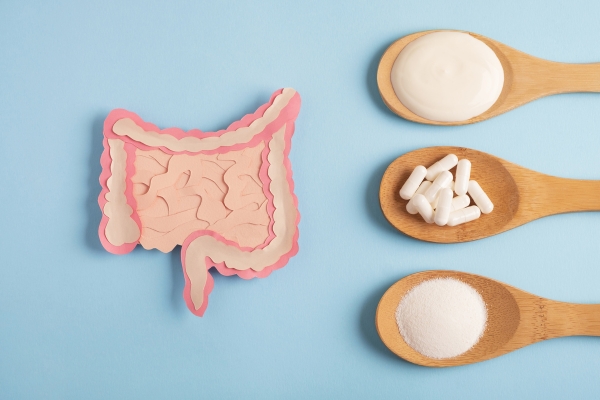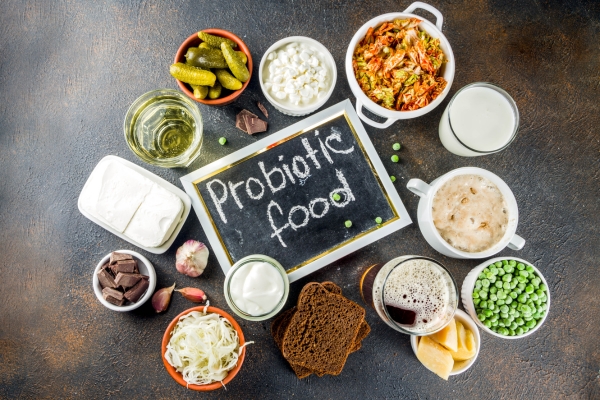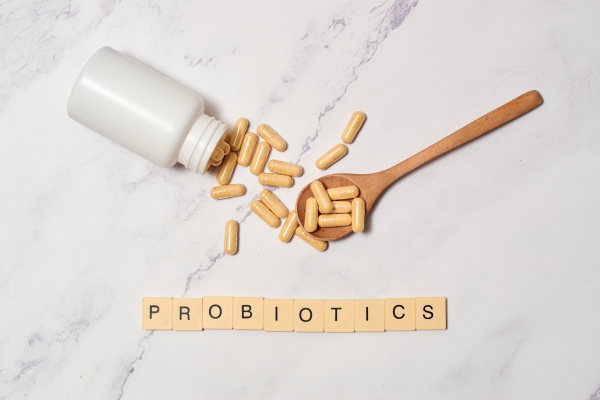Did you know that not all probiotics are created equal?
In fact, some probiotics can be completely ineffective or even harmful if they don’t contain the right strains.
Probiotics are live microorganisms that are often referred to as “good” or “friendly” bacteria because they help maintain a healthy balance in your gut microbiome.
This balance is crucial for digestion, nutrient absorption, and overall immune function.
However, the effectiveness of a probiotic largely depends on the specific strains it contains.
In this article, we will delve into three key categories of beneficial probiotic strains that you should look for in your probiotic supplement.

Traditional Gut-Friendly Bacteria
So, you know how everyone is talking about probiotics these days?
Well, Lactobacillus and Bifidobacterium are two of the main types you should know about.
These good bacteria naturally live in our gut and help keep everything in balance.
Lactobacillus is mostly in the small intestine, helping us break down lactose and sugars, while Bifidobacterium hangs out in the large intestine, breaking down fibers.
Having a balanced gut microbiome is important because it helps with digestion, nutrient absorption, and even our immune system.
If our gut gets out of whack (called dysbiosis), it can lead to all sorts of problems like digestive issues, allergies, and even mood swings.

Lactobacillus Acidophilus
This little guy is great for helping us absorb nutrients better and boosting our immune system.
It’s especially helpful if you’re lactose intolerant because it breaks down lactose.
Plus, it helps produce natural antibodies and keeps our immune cells active. [1]
Bifidobacterium Lactis
This one’s awesome for digestion and can really help if you have IBS (irritable bowel syndrome).
It helps break down carbs, proteins, and fats, making digestion smoother.
It also reduces bloating and gas, which is a big relief if you have IBS. [2]
Lactobacillus Rhamnosus
This strain is a hero for reducing inflammation and promoting healthy skin.
It can help with eczema and other skin issues by calming down the body’s inflammatory response.
Plus, it highlights the gut-skin connection, showing how important gut health is for our skin. [3]

Yeast-Based Probiotics
Saccharomyces boulardii is a unique type of probiotic because it’s actually a yeast, not a bacterium.
This makes it different from the more commonly known probiotics like Lactobacillus and Bifidobacterium.
S. boulardii naturally occurs in tropical fruits like lychee and mangosteen and plays a vital role in maintaining gut health.
Unlike some bacterial probiotics, it can survive the acidic environment of the stomach and reach the intestines alive, where it exerts its beneficial effects.
Prevents and Treats Stomach Issues
One of the most well-documented benefits of Saccharomyces boulardii is its ability to prevent and treat various types of diarrhea, including antibiotic-associated diarrhea and traveler’s diarrhea.
One study found that S. boulardii significantly reduced the incidence of traveler’s diarrhea among participants.
Another study showed that it helped reduce the duration and severity of diarrhea caused by antibiotics by restoring the natural balance of gut flora. [4] [5]
Immune Function and Anti-inflammatory Benefits
Saccharomyces boulardii is also known for its immune-boosting and anti-inflammatory properties.
Studies have revealed that S. boulardii can strengthen the immune system by elevating levels of secretory IgA, a vital antibody that plays a key role in gut health.
Additionally, another study highlighted its anti-inflammatory effects, showing that it can help reduce gut inflammation by modulating inflammatory pathways. [4] [5]

Probiotics from the Soil
Soil-Based Probiotics (SBOs) are a type of probiotic that naturally occur in the soil.
These probiotics were a regular part of ancient diets, as our ancestors consumed them through unwashed fruits and vegetables.
Unlike traditional probiotics, which are typically strains of Lactobacillus and Bifidobacterium, SBOs include a variety of bacterial species that have unique properties.
SBOs are known for their hardiness; they can survive the harsh acidic environment of the stomach, making them highly effective at reaching the intestines intact.
Enhanced Gut Resilience and Microbial Diversity
One of the primary benefits of SBOs is their ability to enhance gut resilience and promote microbial diversity.
A diverse gut microbiome is essential for overall health, as it can protect against pathogens and support various bodily functions.
One study found that supplementation with SBOs increased microbial diversity in the gut, which is associated with improved health outcomes and a reduced risk of various diseases. [6] [7]
Support for Digestive Health and Reduction in Gut Inflammation
SBOs also play a significant role in supporting digestive health and reducing inflammation in the gut.
Research showed that participants taking SBO supplements experienced significant improvements in digestive symptoms such as bloating, gas, and constipation.
Additionally, another study highlighted that SBOs have anti-inflammatory properties, helping to reduce gut inflammation and support a healthier gut lining. [6] [7]

Wrap-Up
Probiotics play a pivotal role in maintaining a healthy gut microbiome, which is essential for digestion, nutrient absorption, and immune function.
However, not all probiotics are created equal.
The effectiveness of a probiotic supplement largely depends on the specific strains it contains.
By focusing on key strains such as Lactobacillus acidophilus, Bifidobacterium lactis, Lactobacillus rhamnosus, Saccharomyces boulardii, and Soil-Based Probiotics (SBOs), you can ensure that your probiotic supplement is not only effective but also beneficial for your overall health.
These strains have been scientifically proven to offer significant benefits, from enhancing nutrient absorption and reducing inflammation to preventing and treating various types of diarrhea and boosting immune function.
Key Points to Remember
Traditional Gut-Friendly Bacteria:
- Lactobacillus acidophilus: Enhances nutrient absorption and boosts immunity.
- Bifidobacterium lactis: Aids digestion and helps alleviate IBS symptoms.
- Lactobacillus rhamnosus: Reduces inflammation and promotes skin health.
Yeast-Based Probiotics:
- Saccharomyces boulardii: Prevents and treats various types of diarrhea, including antibiotic-associated and traveler’s diarrhea.
- Boosts immune function and has anti-inflammatory properties.
Earth-Derived Probiotics:
- Soil-Based Probiotics (SBOs): Enhance gut resilience and promote microbial diversity.
- Support digestive health and reduce gut inflammation.
References
Microorganisms
Jungersen M, Wind A, Johansen E, Christensen JE, Stuer-Lauridsen B, Eskesen D. The Science behind the Probiotic Strain Bifidobacterium animalis subsp. lactis BB-12(®). Microorganisms. 2014 Mar 28;2(2):92-110. doi: 10.3390/microorganisms2020092. PMID: 27682233; PMCID: PMC5029483.
Foods
Mathipa-Mdakane MG, Thantsha MS. Lacticaseibacillus rhamnosus: A Suitable Candidate for the Construction of Novel Bioengineered Probiotic Strains for Targeted Pathogen Control. Foods. 2022 Mar 8;11(6):785. doi: 10.3390/foods11060785. PMID: 35327208; PMCID: PMC8947445.
Therapeutic Advances in Gastroenterology
Kelesidis T, Pothoulakis C. Efficacy and safety of the probiotic Saccharomyces boulardii for the prevention and therapy of gastrointestinal disorders. Therap Adv Gastroenterol. 2012 Mar;5(2):111-25. doi: 10.1177/1756283X11428502. PMID: 22423260; PMCID: PMC3296087.
Journal of Fungi
Pais P, Almeida V, Yılmaz M, Teixeira MC. Saccharomyces boulardii: What Makes It Tick as Successful Probiotic? J Fungi (Basel). 2020 Jun 4;6(2):78. doi: 10.3390/jof6020078. PMID: 32512834; PMCID: PMC7344949.
World Journal of Gastrointestinal Pathophysiology
McFarlin BK, Henning AL, Bowman EM, Gary MA, Carbajal KM. Oral spore-based probiotic supplementation was associated with reduced incidence of post-prandial dietary endotoxin, triglycerides, and disease risk biomarkers. World J Gastrointest Pathophysiol. 2017 Aug 15;8(3):117-126. doi: 10.4291/wjgp.v8.i3.117. PMID: 28868181; PMCID: PMC5561432.
Frontiers in Plant Science
Vassileva M, Flor-Peregrin E, Malusá E, Vassilev N. Towards Better Understanding of the Interactions and Efficient Application of Plant Beneficial Prebiotics, Probiotics, Postbiotics and Synbiotics. Front Plant Sci. 2020 Jul 16;11:1068. doi: 10.3389/fpls.2020.01068. PMID: 32765556; PMCID: PMC7378762.

